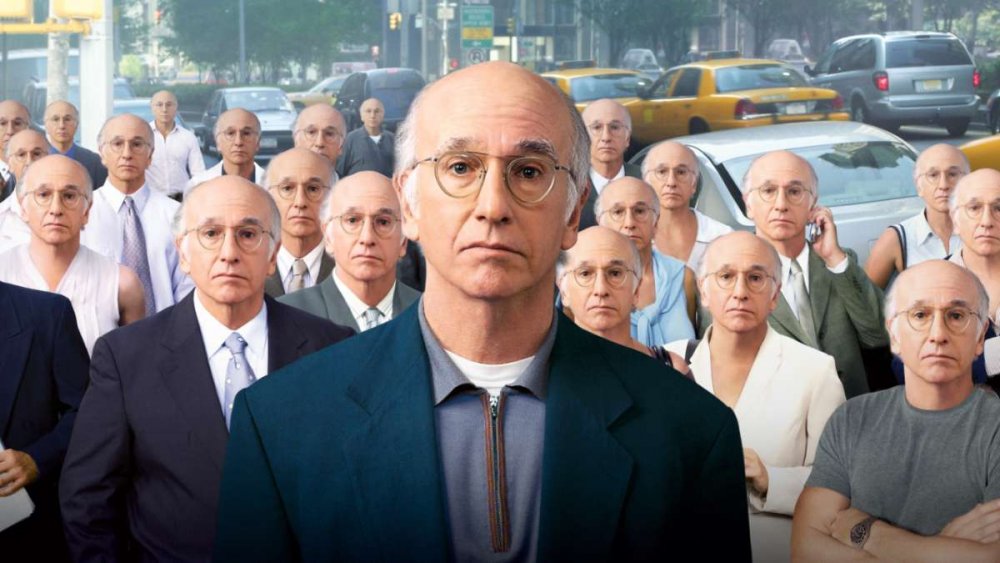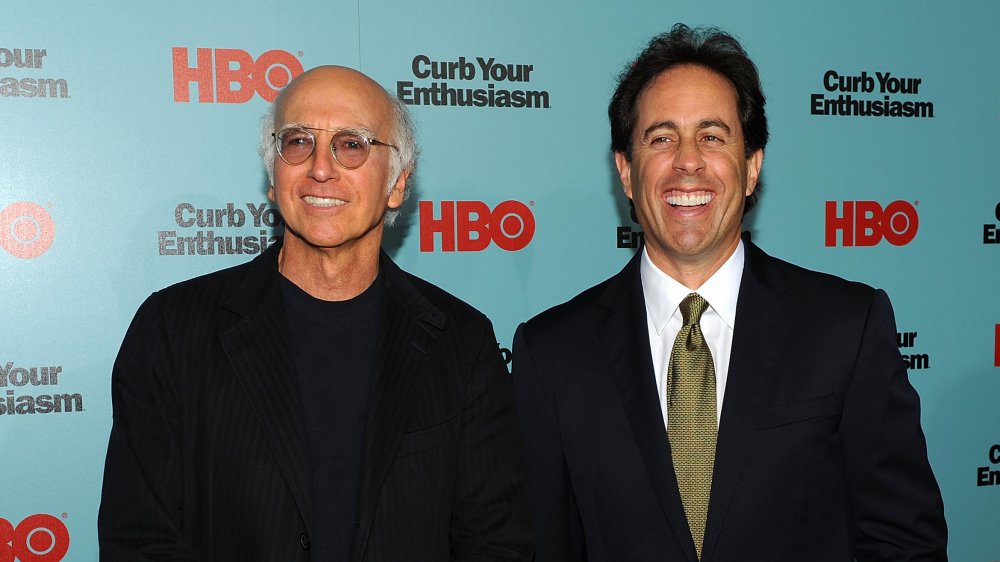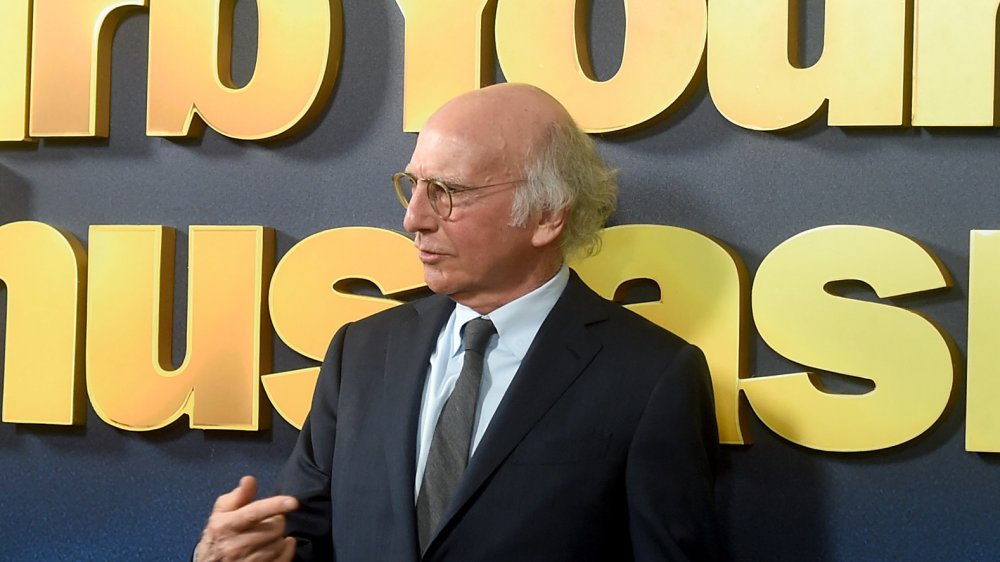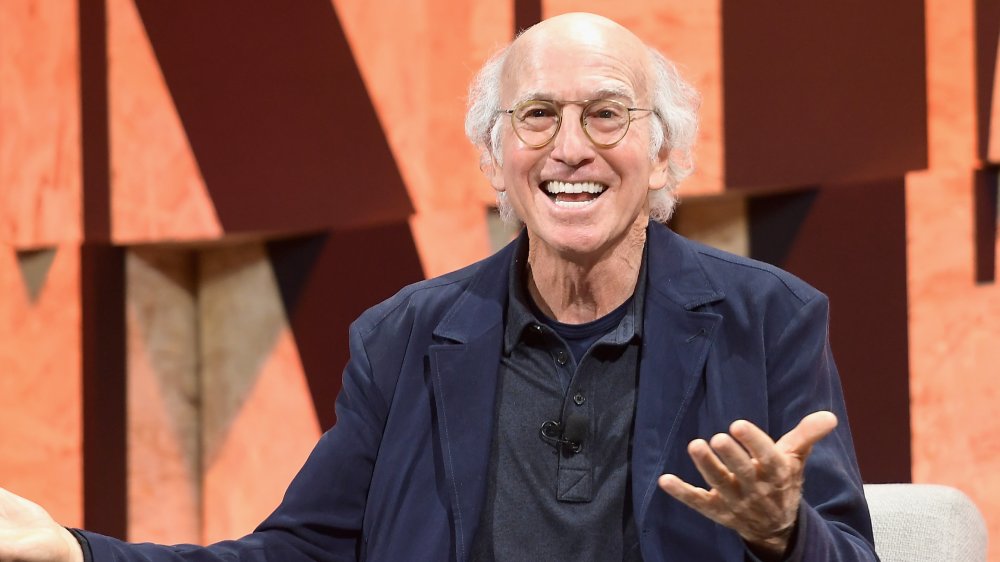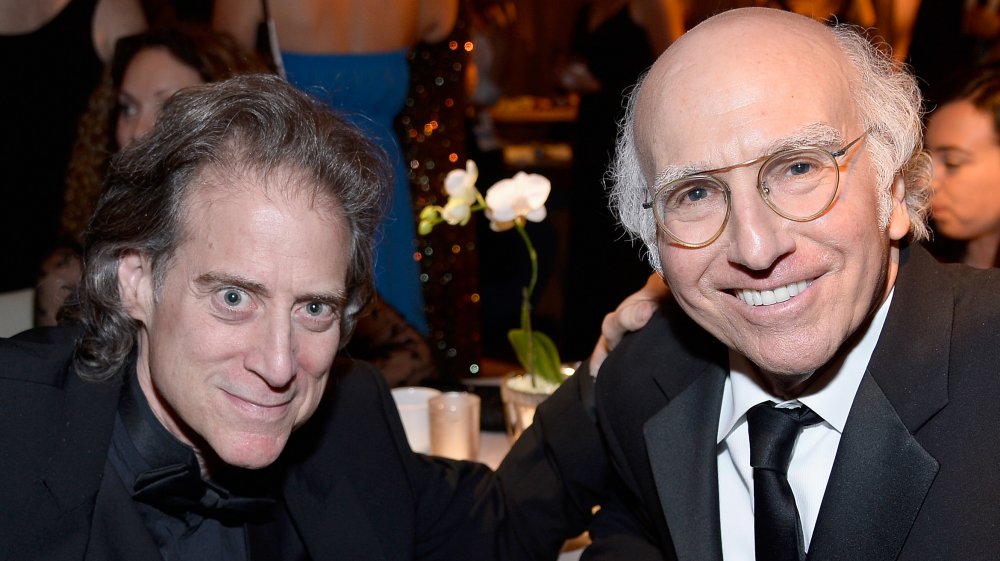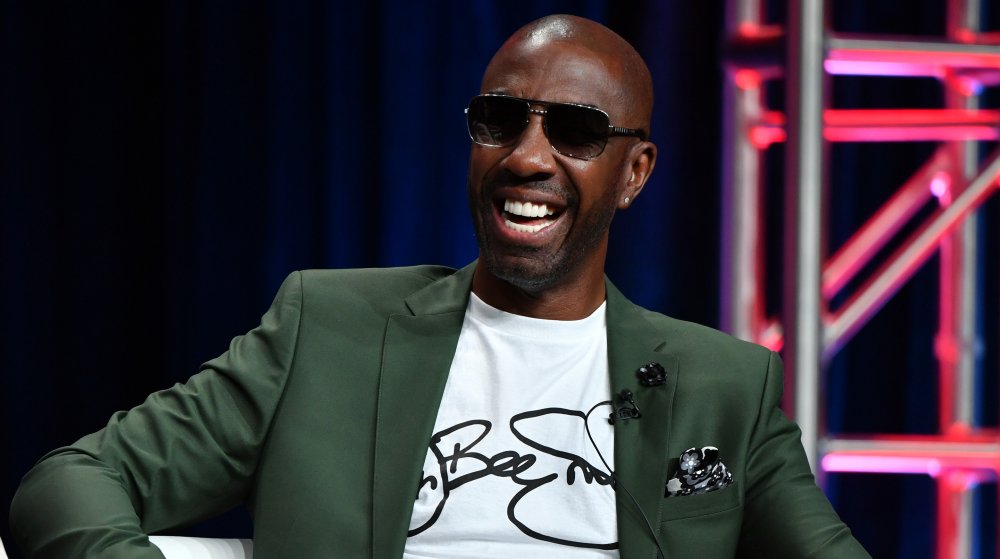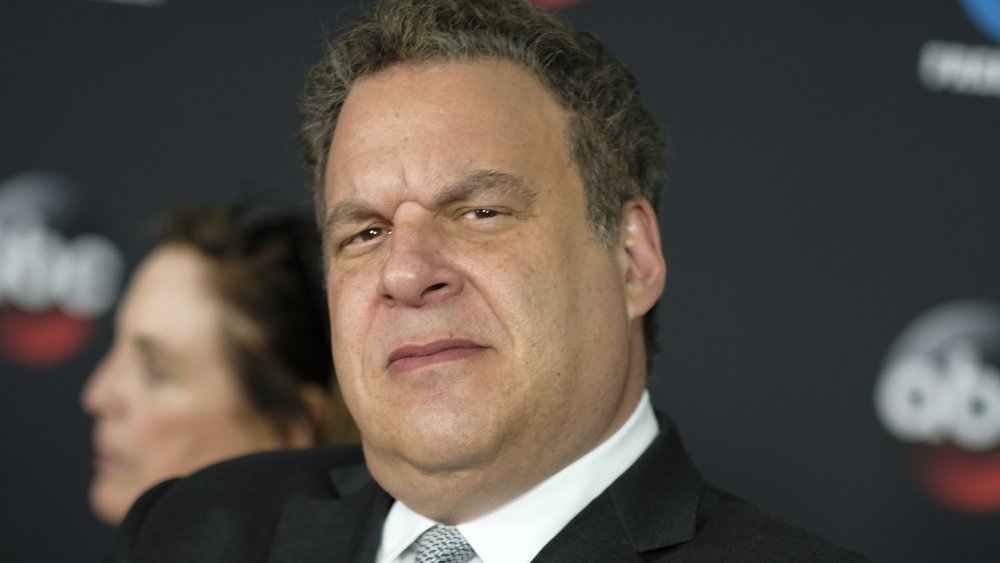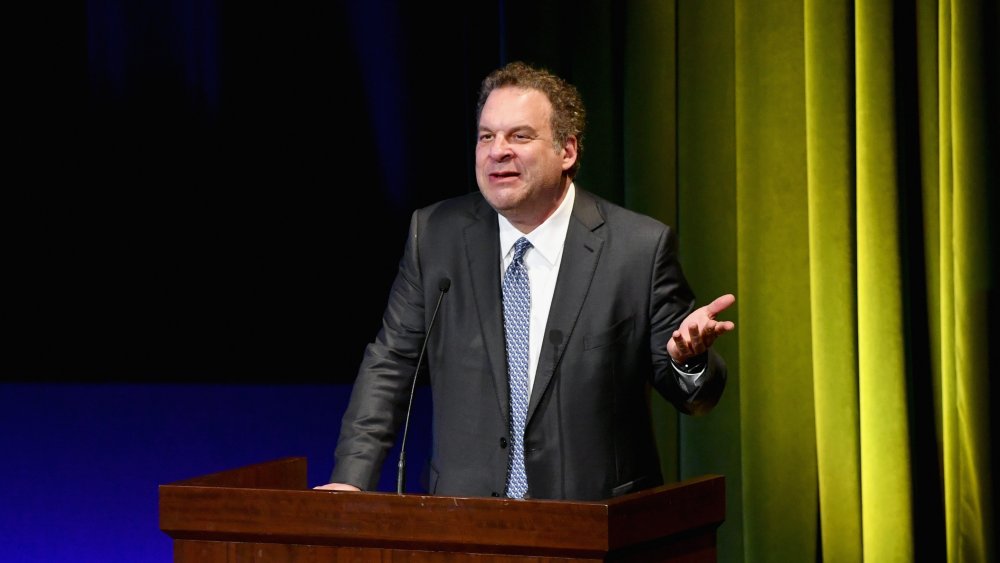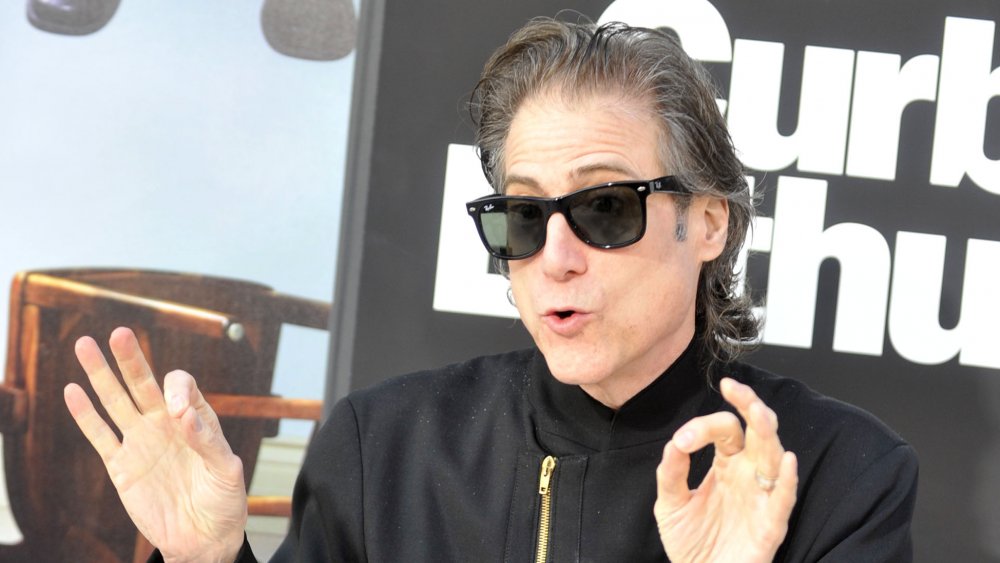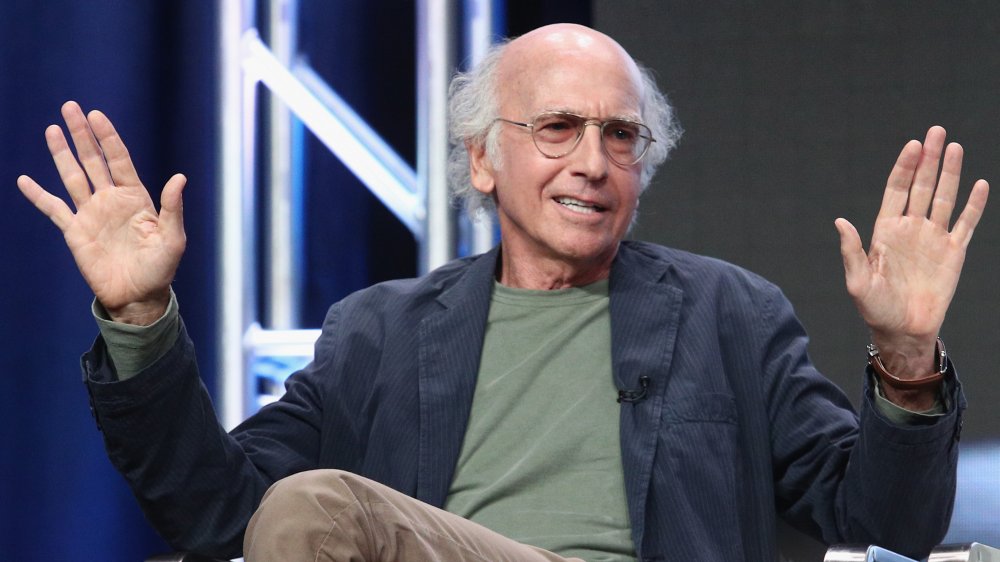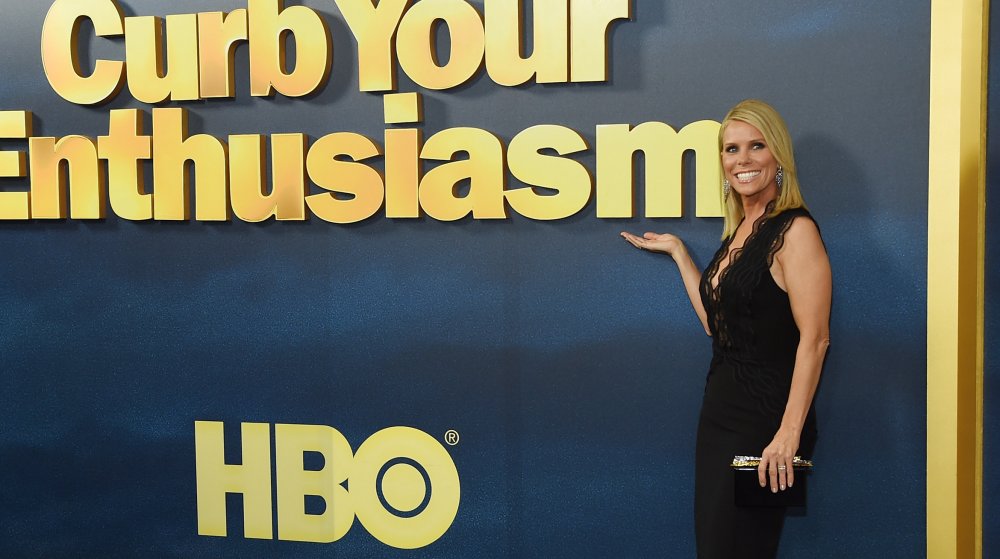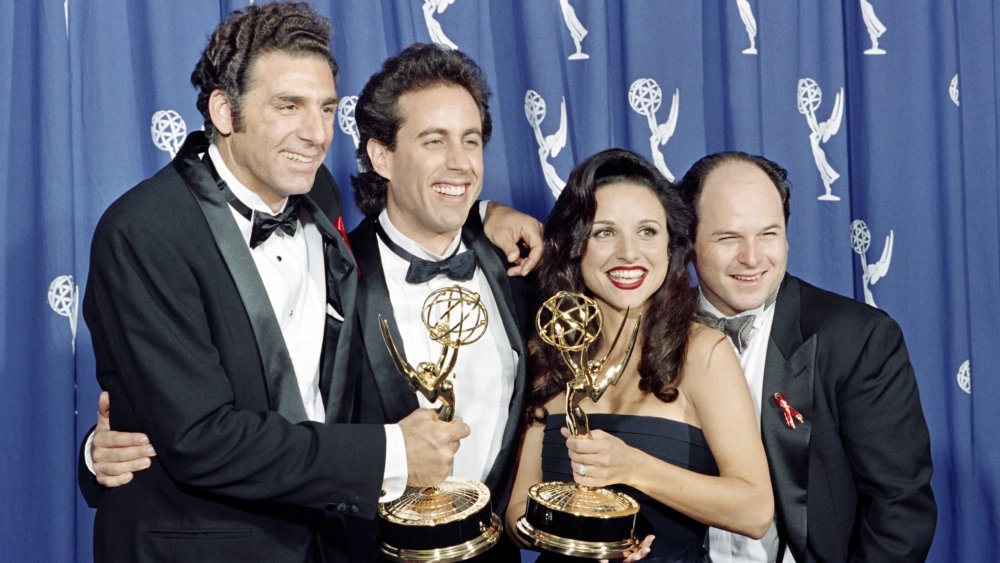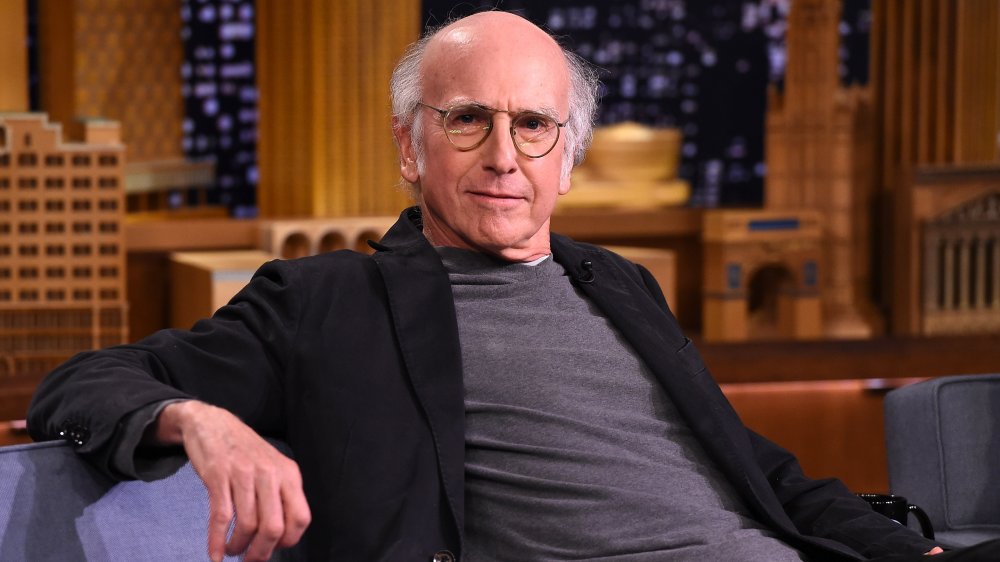The Untold Truth Of Curb Your Enthusiasm
If your name is Larry David, then the laws of physics don't apply and catching lightning in a bottle isn't considered a nearly impossible task — it's something you routinely do.
David (and Jerry Seinfeld) created Seinfeld, which is one of the most revered sitcoms of all time (Seinfeld revolutionized a genre... and it's also a billion-dollar media empire). The "show about nothing" but really about everything paved the way for future sitcoms while putting together a stage of unsympathetic characters that are still adored by the audience. After becoming a sitcom legend with Seinfeld, David took a similar approach and created Curb Your Enthusiasm, and — completing the metaphor — caught lightning in a bottle for the second time.
While Curb Your Enthusiasm isn't as successful as Seinfeld from a monetary standpoint, David managed to create another show — bare hands, brains, and all — that's well-received, long-running, and pretty, pretty, pretty good. The two sitcoms have many differences (most obviously, one takes place in New York and the other mostly in Los Angeles), but it's hard to reference one without mentioning the other.
As with all Hollywood productions, what you see on the screen isn't always what's going on off the screen. Here, dear Curb enthusiasts, is the untold truth of Curb Your Enthusiasm.
The show's name is an ode to Seinfeld — and life
In a 2010 interview with Time, David explained the double meaning behind the title of the show: First, to temper Seinfeld lovers' expectations for Curb; second, to curb your enthusiasm in life because it's "unattractive" and "unseemly." David apparently didn't want fans to think Seinfeld 2.0 was coming, knowing that people can have unnecessary expectations.
Curb Your Enthusiasm has exceeded expectations and the evidence is clear. Curb's going ten seasons strong and holds a fresh rating on Rotten Tomatoes. It has longevity, loving fans, hard to please yet impressed critics, and it's hilarious. The title of the show is iconic and has a great backstory.
Seinfeld, for better or worse, only lasted nine seasons. Curb picked up where Seinfeld left off in terms of a loyal, happy, and eager fanbase and the sitcom is, in fact, worth all the enthusiasm.
Curb Your Enthusiasm helped save a man's life
TV shows and movies really can save people's lives. Los Angeles Dodgers fan Juan Catalan's life was forever changed on May 12, 2003, despite his team losing to the Atlanta Braves. Catalan would face murder allegations three months later, with the murder in question taking place on the same day as the game. Despite having an alibi, he was linked to the crime and the prosecutor was going to push for the death penalty.
Luckily, lights, camera, and action were going strong as Curb happened to be shooting its "The Car Pool Lane" episode and captured Catalan at the game on the same day as the murder. The show's producers agreed to turn over the footage. Catalan was seen at the game. The case was eventually dismissed. Catalan, thanks to an episode of Curb, is a free man.
Who would have thought an episode featuring Larry David picking up a prostitute so he could drive in the carpool lane on the way to a Dodgers game would save someone's life? Life is weird, and miracles can happen.
Larry David's character is the man he wishes he could be in real life
Larry David (played by... Larry David) is an idealized version of who David wants to be in real life. He says it's his version of Superman. The Curb Your Enthusiasm version of David is known to do whatever he wants and calls people out because he can. He doesn't let anyone off the hook and tends to make something out of everything.
If David thinks someone is lying, he'll give the person the Larry David stare, ocular patting down the person in question, and then clear the person with a simple "okay." David puts himself in situations that are easily avoidable, such as shushing Michael J. Fox in season 8, episode 10 and letting that entire situation escalate (because all episodes of Curb escalate). Or chiding a man with a disability for using a regular bathroom stall because the same man called David out earlier in the episode for using a wheelchair-accessible stall in season 5, episode 2. Larry David is going to Larry David.
It's understandable how David the person views David the character — people wish they could say what they're thinking all the time without backlash. Some superheroes wear capes, fight crime, and do things for the greater good. David's unmasked hero has no shame or shyness, and apparently makes a lot of unnecessary messes out of nothing, similar to Seinfeld's George Costanza (played by Jason Alexander), who's based on David.
David and Richard Lewis' relationship started at 12 years old ... as rivals
It's hard to believe real-life Richard Lewis ever didn't like real-life Larry David — and vice versa. It's even harder to believe the two were rivals at 12 years old. In an interview with the New York Daily News, it's revealed that the two went to summer camp together when they were 12. And they, let's say, didn't see eye to eye.
In the interview, Lewis went as far as saying "I hated his guts," adding that they had fistfights. Fast forward to their 20s and they became admirers of one another. Not remembering each other likely had a lot to do with it, as did the mutual respect for each other's comedic talents. Although there would be an "aha" moment down the road when the two realized they were enemies in summer camp all those years ago — and they almost had a fistfight after this moment — they apparently holstered their fists and became great friends.
To make a long story short: Be careful who you deem an enemy when you're 12 years old (or any age, for that matter). You never know when you're going to meet that person again... or what he or she could do for your career.
J.B. Smoove's arrival: wrong place, right time
J.B. Smoove might seem like he was hand-picked for the role of Leon Black, but he made his way to the show with a combination of bad news and good luck, starting with him not getting renewed for a fourth season as a writer on Saturday Night Live. In a Los Angeles Times interview, Smoove shared the story of those crazy events, the story that turned Smoove into one of the most liked characters on Curb. Here's that story in seven parts.
(1) Smoove's friend passes away and the funeral is in Los Angeles. (2) During his one-day trip, Smoove visits his recently-signed agent. (3) Smoove's agent says he has an audition for him. (4) Smoove tells his agent he's only in town for one day. (5) Smoove leaves his agent's office and goes straight to the audition. (6) Smoove returns to Pittsburgh for a comedy show. (7) His agent tells him he got the Leon role.
Life. Happens. Fast. Smoove took advantage of a terrible situation and he's now a fan favorite on Curb, a show he loved before even auditioning. If one of those seven events didn't occur in that order, who knows what would have happened with the Leon role.
Jeff Garlin hates his character
Jeff Garlin isn't a fan of his character, Jeff Greene. In this YouTube video, Garlin describes his Curb character as "an idiot," "not a good guy," and adds, "I have no respect for this guy." He even says he didn't want to be part of the cast, but any fan of the show has to be happy he did it anyway: Greene is David's adulterous manager and best friend, and the series wouldn't be the same without Garlin playing the part. For a person who hates who he's playing, Garlin does a terrific job.
He's also married to Susie Greene (played by Susie Essman), who tends to get into rip-roaring screaming matches with David every time the two are in the same room.
David convinced Garlin to play Greene and everyone, from David and Garlin to Susie and the audience, won. Jeff Greene isn't the most moral character in TV history, but the character is as essential as anyone on the show.
Garlin's character helped him recover from a stroke
No love lost for his character aside, Garlin says his character helped him recover from a medical emergency in real life. Garlin suffered a stroke in February 2000, before season 1 shooting was set to begin. Garlin has also suffered from compulsive eating, a heart defect, diabetes, epilepsy, and attention deficit disorder.
"If you watch the first season, I am so strokey," Garlin said (via The Guardian). "It's funnier to walk with a golf club. But Curb was the best rehab I could have had... the [improvisation] alone did wonders."
Although Garlin isn't fond of his onscreen persona, shooting Curb might have been the best thing for his health, which is a blessing considering he didn't want the job in the first place. Lesson: Never underestimate the value of structure — and, well, improv. As for his career, it appears joining Curb was also a smart decision given the longevity and (for the most part) stability of the show.
Curb's theme song already existed — the catchy tune wasn't made for the show
Curb's theme song, like many theme songs, sounds like it was made for the show. Truth be told, it wasn't. The song, titled "Frolic," was written by Italian composer Luciano Michelini. David heard the song in the background of a bank commercial and knew he needed to use it for a future project, which ended up being Curb.
The theme song, much like the show, isn't intended to be taken seriously. Its circusy vibe is supposed to be comedic, taken lightly, and help set the tone of the upcoming shenanigans. It's the perfect balance of catchy and totally made for Curb Your Enthusiasm. Thanks to David's impressive taste in music, Michelini can now be credited with one of the most memorable television theme songs.
Curb was supposed to be a one-time special mockumentary
According to HBO, "Before it was a comedy series, Curb Your Enthusiasm was a deadpan 1999 mockumentary." The characters were aware of the cameras and crew, giving it that mockumentary style.
The show, of course, evolved into a successful TV series. The original premise documenting David's return to the stand-up circuit sounds like must-watch TV, but ten seasons and counting later, the idea of the show has morphed into something much bigger. It has a terrific theme song. It's been up for countless awards. It gave fans a Seinfeld reunion in season 7, episode 10 while merging the Seinfield and Curb Your Enthusiasm worlds together. If nothing else, an episode of the series helped exonerate a man.
Needless to say, the decision to expand a deadpan mockumentary changed many people's lives. The show is a hit by all measures.
Every episode is heavily improvised
Curb's makeup is special and unique because of its heavily-improvised nature. "I write the scenes where we know everything that's going to happen," Larry David told NPR. "There's an outline of about seven or eight pages, and then we improvise it." That might sound like a challenge to the actors, director, and everyone on the set, but improvisation is a big reason why Curb feels so natural.
Screenwriter, producer, and director Robert B. Weide expands on this groundbreaking format on his website. "We do a rough camera blocking before we start shooting but I tell the actors just to ”blah-blah” the dialogue until the cameras roll," he explained. "My fear is that if they make up a wonderful piece of dialogue, then they'll be self-consciously trying to hit the same mark once we're filming and we'll lose the spontaneity."
This style helps to capture the true emotions of the characters and make it more authentic. After all, what the actors say happens in real time, for the first time, whether it's the first or eighth take.
Don't expect a neatly wrapped series finale
The series finale of Seinfeld received mixed reviews. While the show has an 88 percent rating on Rotten Tomatoes, the finale is heavily debated as one of the worst series conclusions in TV history. David left the show in season 7, but he returned to help write the series finale — and he doesn't want to make the same mistake twice. As he told Grantland, "Well, you know, I got so much grief from the Seinfeld finale, which a lot of people intensely disliked, that I no longer feel a need to wrap things up."
Given that knowledge from the creator of Curb Your Enthusiasm, it appears that if and when David decides to hang up his Curb shoes, fans shouldn't expect it to wrap up as most TV shows do. Who could blame him? It's hard to stick the landing for TV shows. Seinfeld failed many fans with its series finale, as did Game of Thrones, How I Met Your Mother, and even, in many people's hearts, The Sopranos. Perfect writing, acting, and directing is nearly impossible to pull off from start to finish.
Larry David holds infinite power, and TV norms don't matter with the HBO favorite
Curb Your Enthusiasm doesn't care about traditional TV norms. Case in point: It took 17 years to make the first nine seasons. That's not normal. Curb is, as stated earlier, heavily improvised, which also isn't normal. The show will go on hiatus whenever it feels like, largely thanks to Larry David.
David does whatever he wants with Curb because he can. Hollywood grants that power to people who are worth millions of dollars and have created shows that are critically acclaimed while being well-received by fans. Throughout Curb Your Enthusiasm's existence, the only thing fans should expect is the unexpected. If David wants to continue the show, he will. If he wants to wait six more years to drop another season, fans should also expect that. The show could end at any time.
That's one of the beauties of this Larry David classic. Anything goes. Maybe that's a better title for the series now. Then again, Curb Your Enthusiasm is perfect — it says everything that needs to be said in three simple words, and that's pretty, pretty, pretty cool.
